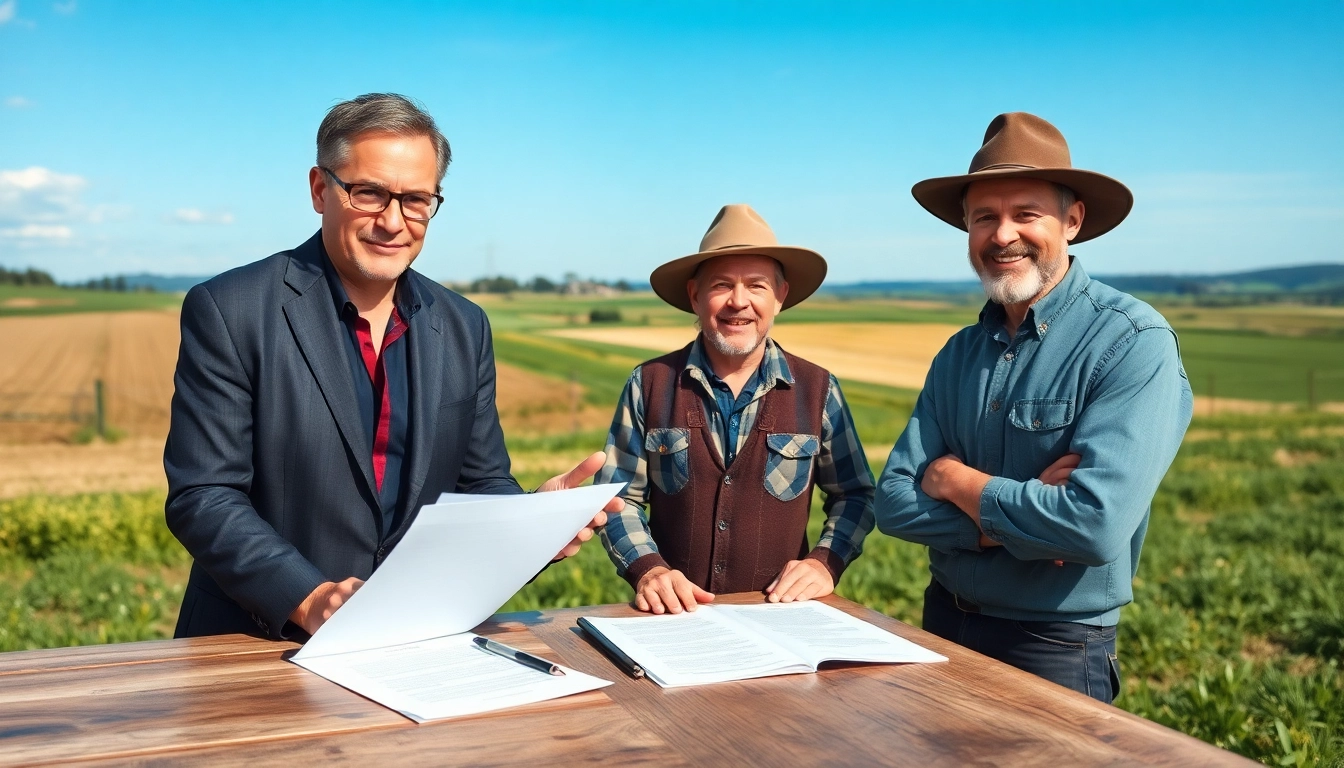Understanding the Role of an Agriculture Lawyer
In the realm of farming and agricultural enterprises, legal intricacies abound. This is where an agriculture lawyer plays a pivotal role, facilitating not just legal compliance but also strategic decision-making. The agriculture lawyer serves as both a counselor and advocate for their clients, who often include farmers, agribusinesses, and landowners. Understanding what these professionals do and how they can assist is essential for anyone involved in the agricultural sector.
What Does an Agriculture Lawyer Do?
An agriculture lawyer specializes in the legal issues that affect the agricultural industry. Their responsibilities encompass a wide range of functions, such as:
- Drafting and reviewing contracts, including those associated with the sale of goods, leases, and employment.
- Advising clients on compliance with regulations concerning land use, environmental protection, and labor laws.
- Representing clients in disputes related to agricultural production, land ownership, and regulatory compliance.
- Assist in the financing and operation of farms and agricultural businesses.
- Navigating issues surrounding natural resource management, including water rights and conservation practices.
By focusing on these areas, agriculture lawyers ensure that their clients operate within the legal framework governing the agricultural sector, thereby mitigating risks and promoting sustainability.
Key Skills and Qualifications of an Agriculture Lawyer
To effectively represent farmers and agribusinesses, agriculture lawyers must possess a unique blend of skills and qualifications. Key attributes include:
- Legal expertise: A thorough understanding of agricultural law and related legal fields, such as environmental and contract law.
- Analytical thinking: The ability to assess complex legal scenarios and provide actionable advice.
- Communication skills: Clear and effective communication with clients and regulatory bodies is paramount.
- Negotiation skills: Many agricultural disputes are resolved out of court, making strong negotiation abilities essential.
- Knowledge of the agricultural industry: An understanding of farming practices, agronomy, and economic pressures faced by farmers can provide invaluable context in legal matters.
Importance of Agriculture Lawyers in Farm Operations
Agriculture lawyers play a critical role in farm operations. Their guidance ensures that farming practices align with regulatory requirements while also protecting the interests of the farm owner. For example:
- Risk Management: Assisting farmers in understanding and mitigating risks related to compliance and liability.
- Financial Planning: Helping agribusinesses navigate financial transactions, including loans, grants, and subsidies.
- Dispute Resolution: Facilitating a resolution to conflicts that may arise with employees, suppliers, and governmental bodies, thus ensuring business continuity.
By taking a proactive approach, agriculture lawyers can save their clients time and money while ensuring operational efficiency.
Common Legal Issues Faced in Agriculture
The agricultural sector is rife with legal complexities that demand careful consideration. Below are some of the most pressing legal issues that agriculture lawyers commonly address.
Contracts and Agreements in Farming
Contracts and agreements form the backbone of agricultural operations. These can include:
- Purchase Agreements: Contracts that outline the sale of crops or livestock.
- Lease Agreements: Legal documents specifying the terms under which land is rented or leased.
- Supplier Agreements: Contracts with vendors for seeds, fertilizers, and equipment.
An agriculture lawyer ensures that these contracts are legally binding and protect the rights of their clients, reducing the potential for disputes.
Land Use Regulations and Zoning Laws
Land ownership and use are often governed by various regulations and zoning laws. Agriculture lawyers help their clients navigate:
- Zoning Issues: Determining whether land is zoned for agricultural use and what limitations may apply.
- Land Use Permits: Securing necessary permits for farming activities and ensuring compliance with local ordinances.
Understanding these regulations can significantly affect a farm’s operations and expansion possibilities.
Environmental Compliance Issues for Farms
Environmental regulations are becoming increasingly stringent, especially for farms that are resource-intensive. Agriculture lawyers guide farmers in:
- Understanding Regulatory Requirements: Ensuring compliance with laws related to water use, waste management, and pesticide application.
- Permitting: Assisting in obtaining necessary environmental permits for land use.
- Dispute Resolution: Managing disputes with environmental agencies and addressing non-compliance issues.
With the right legal guidance, farmers can not only avoid fines and sanctions but can also improve their practices in a sustainable manner.
Choosing the Right Agriculture Lawyer for Your Needs
Selecting the right agriculture lawyer is crucial for effective legal representation. There are several factors to consider during this process.
Factors to Consider When Hiring
When searching for an agriculture lawyer, potential clients should take into account the following:
- Experience in Agricultural Law: Look for lawyers with a proven track record in agricultural law and relevant experience.
- Reputation: Seek reviews and testimonials from past clients and peers in the industry.
- Communication Style: Ensure the lawyer communicates clearly and efficiently, responding promptly to inquiries.
- Availability: Consider whether the lawyer can commit adequate time and resources to your case.
Questions to Ask During Consultations
During initial consultations, it’s important to pose relevant questions to ascertain the lawyer’s fit for your needs:
- What is your experience with legal issues specific to my type of agricultural operation?
- Can you provide examples of similar cases you have successfully handled?
- What is your approach to negotiation and dispute resolution?
- What are your fees, and how do you structure your billing?
Evaluating Experience and Expertise
Assessing a lawyer’s experience and expertise is key to securing effective legal representation. Potential clients should:
- Review credentials and relevant degrees.
- Investigate any professional memberships, such as the American Agricultural Law Association.
- Request references from previous clients or colleagues.
Establishing a lawyer’s background and success in agricultural law can significantly impact your legal outcomes.
How Agriculture Lawyers Support Farmers
Agriculture lawyers serve not only as legal counsel but also as strategic partners in the success of farming operations. They provide critical support in several key areas:
Negotiations with Government Agencies
Farmers may find themselves interacting regularly with government entities, whether to secure funding, obtain permits, or address compliance issues. Agriculture lawyers facilitate:
- Effective Communication: Acting as a liaison to ensure that farmers’ concerns are adequately addressed.
- Compliance Guidance: Helping farmers understand regulatory changes and participating in negotiations for favorable terms.
Dispute Resolution in Agricultural Matters
Disputes can arise in various forms, from contractual disagreements to regulatory challenges. Agriculture lawyers assist in resolving these issues by:
- Negotiation: Engaging in discussions to reach an amicable resolution.
- Mediation and Arbitration: Utilizing alternative dispute resolution methods when negotiations stall.
- Litigation: Representing clients in court when disputes necessitate formal legal action.
Advocacy for Farmers’ Rights
Beyond individual cases, agriculture lawyers often engage in advocacy to support broader agricultural interests. This might involve:
- Legislative Engagement: Lobbying for policies that benefit the agricultural community and addressing unfavorable regulations.
- Public Awareness Campaigns: Educating the public and farmers about legal rights and responsibilities.
Such advocacy not only supports individual farmers but also strengthens the agricultural industry as a whole.
Future Trends in Agricultural Law
The agricultural landscape is rapidly shifting due to technology, environmental concerns, and changing legal frameworks. Agriculture lawyers must stay abreast of these trends to provide the best support to their clients:
Impact of Technology on Agriculture Law
Advancements in technology are changing the way farms operate, which in turn generates new legal considerations. Examples include:
- Data Privacy: With the rise of smart farming technologies, concerns around data collection and privacy emerge.
- Intellectual Property: Innovations in crop production and biotechnology present new legal challenges in patenting and ownership.
Agriculture lawyers must understand these aspects to effectively advise their clients on safeguarding their technological assets.
Emerging Legal Challenges in Sustainable Farming
The shift towards sustainable practices introduces new legal challenges, such as:
- Certification Requirements: Understanding the legal implications of participating in organic or sustainable programs.
- Environmental Regulations: Navigating laws that govern sustainable resource management and land use.
Staying informed about these challenges enables agriculture lawyers to help farmers implement sustainable practices while remaining compliant.
The Evolving Role of Agriculture Lawyers in a Changing Landscape
As agriculture adapts to societal changes, the role of agriculture lawyers will continue to evolve. Future directions may include:
- Proactive Education: Offering educational resources to clients about emerging laws and technologies.
- Collaborative Approaches: Partnering with other professionals such as agronomists and environmental consultants to provide comprehensive legal services.
By anticipating first-rate legal solutions in these evolving contexts, agriculture lawyers will play an increasingly crucial role in the agricultural industry’s future.



